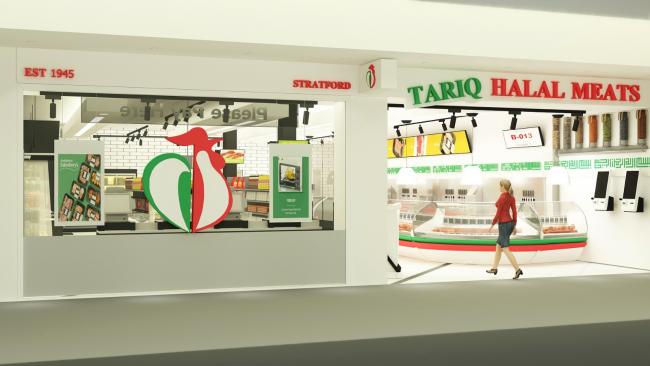If you read The Jew & The Carrot frequently, you have likely read about the crop of sustainable, kosher meat coops
sprouting up in communities across the country. But what about other
faith traditions? As it turns out, one organization in Chicago is on a
different religious path, but entirely the same wave length when it
comes to ethical meat consumption.
In 2001, a Chicago-based interfaith educational organization, Faith in Place, created Taqwa, an Eco-Food Cooperative that offers meat that satisfies religious dietary requirements of the Muslim community (halal
– or lawful), while simultaneously meeting fair labor and ecological
standards. Today Taqwa serves organic pastured beef, lamb, and chicken
to about 80 families, about half who are Muslim. All the animals are
humanly raised by local Illinois farmers, and slaughtered solely by
qualified Muslims. According to their website:
dhabiha (the Islamic procedure for slaughtering
that is comparable to kashrut) meat is considered the only type of meat
that is deemed lawful for consumption by many Muslims. For others, it
is the preferred mode of slaughter. For Muslims and non-Muslims alike,
it is important to note that research has proven that severing the four
major blood vessels of the neck and draining the blood is the most
healthful manner of slaughtering animals.
Last week, I spoke with Faith in Place’s Executive Director and Taqwa co-founder, Reverend Dr. Clare Butterfield who shares in the desire to eat humanely raised animals with other members of her home congregation Unity Temple
in Oak Park (the Unitarian Universalist congregation). She told me
about the inspiration behind Taqwa, why the model of Muslim meat coops
cannot exist on a larger scale, and why that’s okay.
Read the interview after the jump…
What was the catalyst that got Taqwa started? By whom?
The real catalyst for Taqwa was a desire by Faith in Place to have
more Muslim participation in all our activities. As a theory of
organizing we understood that people needed a reason to talk to us, and
we were aware that there was no meat available in Chicago that was both
Organic and Zabeeha. We thought if we provided a product that was both
it would help us to create relationships in the Muslim community,
especially after 9/11, when that got particularly hard.
Taqwa was started by me and by our first staff member at Faith in
Place besides me, Shireen Pishdadi, who is Muslim, and who helped us to
establish our first relationships with Muslims in the project.
Your meats are halal and dhabiha, but you also provide a product that is tayyib. Is the idea of tayyib part of a larger organized movement within the Muslim community, as perhaps comparable to the idea of Heksher Tzedek (ethical standards for Jewish dietary laws) in the Jewish community?
The word tayyib means “wholesome” and we understand it to
embrace the full larger ethical standard of producing food – service to
four communities of earth, farmers, animals and consumers. So the
animals are treated kindly and with gratitude for the great sacrifice
that they make to support our lives, the earth is treated kindly and
sustainably in their raising, the farmers are treated well and with
respect and fair compensation for their labor, and the consumers are
treated kindly in that they product they eat is healthy and wholesome
for them.
Who are your farmers who produce your product? How do they
become involved in Taqwa? What are the standards a farmer must have in
place to be part of your cooperative?
Our farmers are all from Illinois and most of them are on farms
within 200 miles of Chicago. Because of the requirements of our ag
licensing we can’t cross state lines for meat (even though some farmers
in Indiana and Wisconsin are actually closer to us than the ones we use
in Illinois) but for a city the size of Chicago 200 miles is certainly
“local.” We search them out by various means – through a couple of
local organizations that support local farmers and have web sites to
source from them, etc. And then we visit their farms to make sure that
the animals are really treated well. We aren’t looking for scandal –
just that animals have meaningful access to the outside (even if
they’re wandering around on the barn floor, we prefer animals that are
actually pastured) and that they get to live their lives as they
instinctively live them. So chickens get to scratch around for bugs as
they were meant to do, and calves are left with their mothers, and
lambs don’t have their tails docked and are left in the pens with their
ewes, and again on pasture.
Our farmers are motivated by the same kinds of concerns that we
have, which is why the relationship with them is such a pleasure.
We’re looking for a setting that is arranged around the needs of the
animals while they live, rather than around the efficiency of human
food production. And we’re willing to pay extra for that. Which
generally means that we eat smaller servings of meat and fewer of them
each week, which is healthy. The whole system is healthy for us and for
the farms we buy from. Our farmers are motivated by the same kinds of
concerns that we have, which is why the relationship with them is such
a pleasure for all of us.
Do you see Taqwa becoming a model for other ecologically-minded cooperatives?
I do see it as a model, because it isn’t something that’s going to
grow to large scale. It’s scalability is in replication in many places.
It isn’t easy to do what we’ve done (if we’d known how complicated it
was going to be at the outset we might not have done it). It will never
be a money-maker (in fact, if Faith in Place didn’t staff it I don’t
think it would happen, because people just don’t have the flexibility
in their lives to volunteer the kind of time this takes to get their
meat).
This is the kind of thing that highly-motivated folks with the
luxury to be able to pull it together will do. It isn’t a wide-scale
solution, but it does point to some of the problems and some of the
things we’re going to have to reckon with to find larger scale
solutions. By that I mean the pricing structure, our insistence on
large amounts of cheap meat, and all the ecological issues that are
raised by confinement meat operations. Let alone the humane questions
of rearing animals under those conditions.
I don’t think there is a one-size fits all solution to the current
sorry state of food production. There are going to be many different,
creative solutions working in harmony. This is one of them and it could
be replicated.
For more information on Taqwa visit their website




